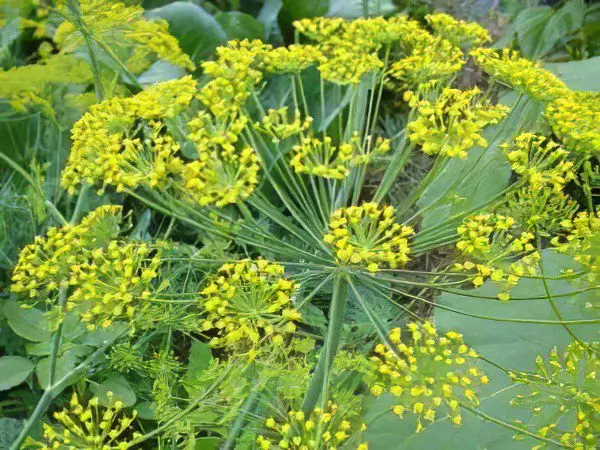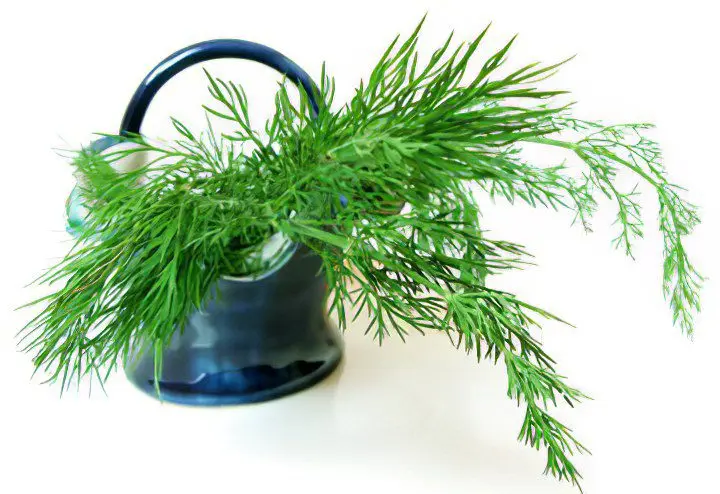Contents

Dill is a fragrant plant with a straight stem that grows no higher than 120 cm. The stem of dill, thin and branched, is colored dark green. The leaves of the plant are egg-shaped, depending on the location, they have a different shape. For example, the lower leaves are long, located on wide petioles. The leaves at the top of the stem are sessile and sheathed. Dill flowers are collected in large umbrellas. Dill seeds are ovoid and oval in shape.
This herb flowers from June to July. The plant is cultivated throughout Russia. Dill can also be found growing wild.
Composition and calorie content
Calories 43 KKal
- Fats:
1,1 g
- Proteins:
3,5 g
- Carbohydrates:
7 g
- Water:
85,9 g
- Ash:
2,5 g
- Cellulose:
2,8 g
Vitamins (in 100 g): | Quantity | %RDN |
Vitamin C (ascorbic acid) | 85-100 mg | 132,1% |
Beta-carotene | 2640-8650 μg | 112,8% |
Vitamin K | 62,8 mcg | 52,3% |
Vitamin A (retinol) | 386 mcg | 48% |
Vitamin B9 (folic acid) | 150 mcg | 37,5% |
Vitamin B2 (riboflavin) | 0,3 mg | 15% |
Vitamin E (alpha tocopherol) | 1,7 mg | 11,3% |
Lutein + Zeaxanthin | 607 mcg | 10,1% |
Minerals (in 100 g): | Quantity | %RDN |
Manganese | 780-7400 μg | 204,5% |
Hardware | 1,7-22,8 mg | 81,7% |
Chrome | 20,3 mcg | 40,6% |
Silver | 2,6 mcg | 37,1% |
Cobalt | 3,4 mcg | 34% |
* Strontium | 80-400 μg | 30% |
potassium | 592-738 mg | 26,6% |
Copper | 170-290 μg | 23% |
Calcium | 111-394 mg | 23% |
Vanadium | 8,8 mcg | 22% |
Full chemical composition ➤
Other important connections:
Phytosterols — 66 mg (120% of RDI)
Purine – 1,5 mg (1,7% of the RDA)
Oxalic acid — 2,1 mg (0,5% of RDI)
Useful properties of dill
Dill has vasodilating, laxative, anti-inflammatory and expectorant properties. In addition, this plant is used as a good sedative and hypnotic. Dill improves appetite, strengthens the immune system and normalizes the functioning of the mammary glands. A decoction and infusion of dill have choleretic and soothing properties. An infusion prepared from the leaves of the plant helps relieve inflammation and redness of the eyes. Dill is an excellent stimulant of gastric juice.
Dill lowers blood pressure, improves heart function, relieves headaches. Infusion of herbs relaxes the intestines, can increase diuresis. Newborns who have problems with the tummy are recommended to take dill water.
dill oil
Dill oil is indicated for shock and nervousness, as it has a calming effect. Dill essential oil has bactericidal and sedative properties. Dill oil is recommended for hiccups and poor appetite, it improves digestion. Women with menstrual irregularities are also advised to consume dill oil.
Dill oil is used for pain in the abdomen, itching of the skin, gout, constipation, nervousness and other ailments. It helps in the treatment of wounds that do not heal for a long time, and also improves lactation in nursing mothers.
The use of dill

Traditional medicine uses dill in the form of tea, decoction, infusion of roots and leaves. Dill preparations are used to improve appetite, for diseases of the intestines, liver and abdominal pain. Dill is recommended for pyelonephritis, gastritis and diseases of the respiratory system. Dill infusion is used for hypertension, purulent wounds.
Dill for newborns. Take 1 tablespoon of fennel seeds and pour a glass of boiling water over them. Cover the container with a lid and let it brew for a quarter of an hour. After straining the finished water, it is given to the child 1 teaspoon 5 times a day. The same decoction can be used to treat diseases of the urinary system and inflammation of the respiratory tract.
Dill for bloating. Take 2 tablespoons of dill seeds and pour 200 ml of boiling water. Leave the composition for 2 hours to brew in a closed container. After straining the infusion, it is taken in a tablespoon three times a day 20-30 minutes before meals.
Dill for cysts. To prepare this decoction, you need to take dill grass in the amount of three tablespoons, chop it and pour 200 ml of boiling water. Put the composition in a water bath for 20 minutes. After removing from heat, leave the broth to infuse for 45 minutes. Take this medicine three times a day, 70 ml.
Dill for worms. We take 1 tablespoon of seeds and fill them with a glass of milk. We put on fire for 5 minutes, then remove and cool for half an hour. Take the remedy warm for worms.
Contraindications to the use of dill
There are no contraindications to the use of dill. People who have increased stomach acidity should use dill preparations with caution.









